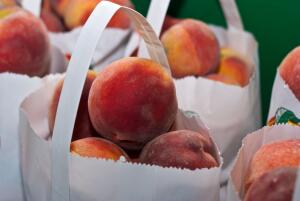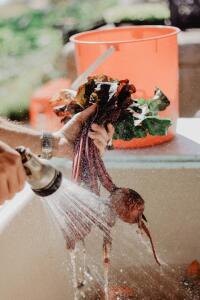
In Season Right Now: Peaches
 What’s a summer fruit that is fuzzy, juicy, sweet to the smell and taste, and downright delicious? It’s none other than an all-time favorite – peaches! Peaches are categorized as a stone fruit that are high in antioxidants that also hold anti-inflammatory and anti-fungal properties. Peaches originated in China, but these days, Georgia is known as the “Peach State.” It’s my opinion that local CNY peaches are just as good as Georgia peaches. Peaches prevailing from Pennsylvania will hit our local markets before the local peaches are ready and those are also guaranteed to satisfy any fruit as well.
What’s a summer fruit that is fuzzy, juicy, sweet to the smell and taste, and downright delicious? It’s none other than an all-time favorite – peaches! Peaches are categorized as a stone fruit that are high in antioxidants that also hold anti-inflammatory and anti-fungal properties. Peaches originated in China, but these days, Georgia is known as the “Peach State.” It’s my opinion that local CNY peaches are just as good as Georgia peaches. Peaches prevailing from Pennsylvania will hit our local markets before the local peaches are ready and those are also guaranteed to satisfy any fruit as well.
There are several common types of peaches to look for at the market: white, yellow, donut (sometimes called a Saturn peach), freestone or clingstone (this property is used describe whether or not the flesh clings to the pit of the peach), and nectarines (even though they are marketed and labeled as a different kind of fruit, they are genetically identical to peaches except that they have non-fuzzy skin).
Health Benefits
Source: Dr. Josh Axe
The health benefits of this simple fruit are impressive. For the most benefit, I suggest to eat fresh peaches over canned or preserved versions.
- Combats free radicals
- Fights and prevents cancer
- Prevents cardiovascular disease and metabolic syndrome
- Reduces inflammation
- Improves gut health
- Destroys candida fungus
- Supports healthy eyes
Ways to Eat Peaches
Ripen peaches are room temperature and enjoy them in or on: cereal, pancakes, waffles, jam/jelly, oatmeal, yogurt, on salads (use slightly unripe peaches for salads), as snacks, and in baked goods (use slightly over-ripened peaches in baked goods) such as muffins, cobbler, pies, and cakes (try peach pound cake). For a novel dessert, try this stone fruit (and others, like plums or apricots) on the grill for a perfect ending to a summer picnic. Serve on a platter with whipped cream or mascarpone, ice cream, brown sugar butter, a drizzle of honey, or just eat plain!
Nutrition Facts – Peach (medium size):
- 60 calories
- 14 g of Carbohydrates
- 1.4 g of Protein
- 0 g of Fat
- 0 g of Cholesterol
- 2.3 g of Fiber
- 285 g of Potassium
- High in Vitamins A and C
Sports Nutrition Tip of the Month: Beets
 BYOB just might become your new slogan after reading this: Bring Your Own Beets!
BYOB just might become your new slogan after reading this: Bring Your Own Beets!
Last month, I highlighted all the rage over pickles and this month, here’s a superfood powerhouse that’s bound to make its way to your next meal (or to a glass). Beets are such a simple root vegetable that are downright hardy enough to withstand unpredictable weather patterns, and when it comes to antioxidants and the way it can enhance athlete performance, there’s a lot of science to back this one up! While most of this information in this section speaks directly to the beet itself, let’s not forget that you can also eat the beet greens. Use them in any recipe where you would normally include greens. My CSA guy told me, “Try beet greens….they’ll change your life!”
Here’s the dirt on beets from a personal and scientific standpoint: I started experimenting with beet juice pre-race about 5 years ago. While I don’t want to make this out to be a miracle vegetable (because there are a lot of factors at play that impact our performance at athletes), I turned into a regular on the podium. I drank beet juice the night before a race and about 3 hours before the race. I experimented with different amounts and found out the hard way that too much beet juice had a laxative effect, so in this case, sometimes less is best. It didn’t seem to matter if I did a shorter 45-minute race or a hard 2-hour effort, either way, I was getting results. When I looked into the science, here’s what I found: beets contain nitrates which turn into nitric oxide (NO) in the muscles. This is helpful for exercise performance because it dilates your blood vessels therefore, allowing more blood flow which in turn lowers your blood pressure (i.e., the heart doesn’t have to work as hard to pump the blood you need). There’s several studies published in peer-reviewed journals that report a 3% reduction of oxygen was used by endurance athletes when they consumed beet juice as opposed to those in the placebo group. The International Olympic Committee recently acknowledged that nitrates have “good evidence of benefits” which might make this one of the best foods for athletes. Along similar lines, red spinach is also being studied for its exercise-enhancing nitrates and there is similar evidence to back-up the use of this vegetable as well.
If you are inclined to try beets, I suggest to go slow and don’t use too much too soon until you know how it affects you. There are quite a few options on the market these days (under various sports nutrition lines), but I suggest trying whole, real foods first. Try eating cooked beets the night before a race or drinking organic beet juice and if you don’t stomach these well, try sports nutrition products typically made with beet powder. NOTE: Beets are naturally high in sugars so be prepared to see a jump in your overall sugar intake if you are tracking your meals in an online food log. Also, due to this sugar content, I would suggest to drink beet juice about 2-3 hours before a workout or competition to allow blood sugars levels to regulate.
Katina Sayers is the owner/operator of Katina’s Nutritional Coaching Corner. She has an extensive background in health and education that began with degrees in exercise physiology, health and physical education, community health, and culminating with a doctoral degree in curriculum and instruction. She completed an advanced certificate of study in Integrative Nutrition and Health Coaching from the renowned Institute for Integrative Nutrition (IIN) in New York City. For the last four years, she has worked one-on-one with clients, presented a multitude of nutrition topics for large and small audiences, contracted with businesses to implement worksite wellness initiatives, and currently manages day-to-day food service operations at a local non-profit agency, as well as directs activities related to nutrition and health. Katina can be reached at ksayerswalker@gmail.com.
Latest News
Upcoming Events
Tully Free Library Turkey Trot 5K Run/Walk
All Day | 5872 Meeting House Rd, Tully, NY 13159
The Tully Free Library Turkey Trot 5K Run/Walk is held every year on Thanksgiving Day mornin…
Learn More ›Live Like Liam
All Day | Jamesville-DeWitt High School, 6845 Edinger Dr, De Witt, NY 13214
"Live Like Liam"... Celebrate life and community as you help fund important initiatives in L…
Learn More ›
Connect With Us
see the latest from Fleet Feet Syracuse